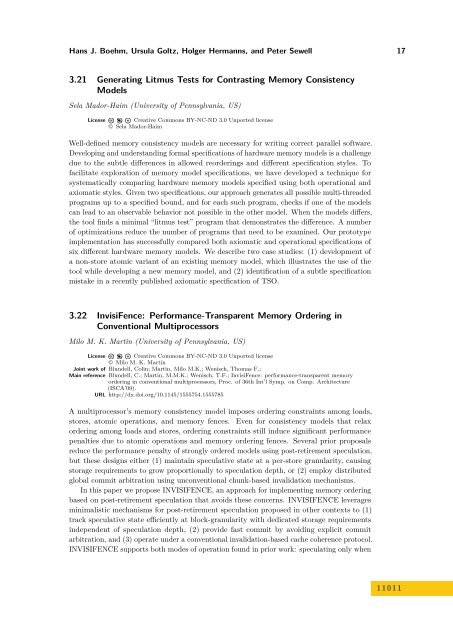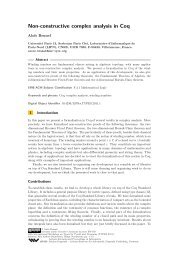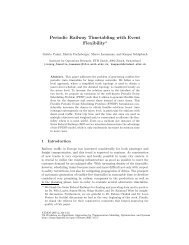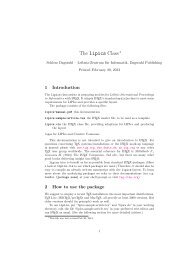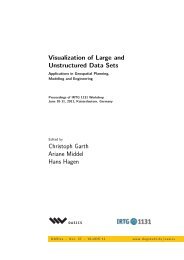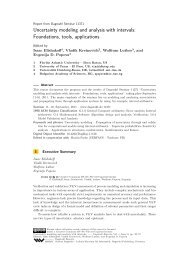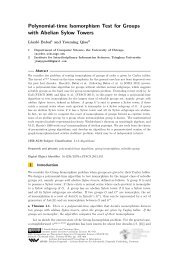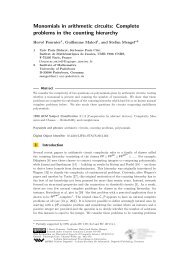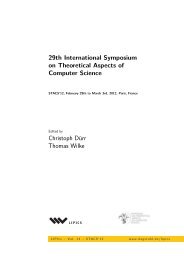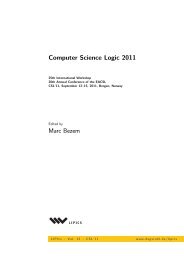Volume 1, Issue 1, January 2011 - DROPS - Schloss Dagstuhl
Volume 1, Issue 1, January 2011 - DROPS - Schloss Dagstuhl
Volume 1, Issue 1, January 2011 - DROPS - Schloss Dagstuhl
You also want an ePaper? Increase the reach of your titles
YUMPU automatically turns print PDFs into web optimized ePapers that Google loves.
Hans J. Boehm, Ursula Goltz, Holger Hermanns, and Peter Sewell 17<br />
3.21 Generating Litmus Tests for Contrasting Memory Consistency<br />
Models<br />
Sela Mador-Haim (University of Pennsylvania, US)<br />
License Creative Commons BY-NC-ND 3.0 Unported license<br />
© Sela Mador-Haim<br />
Well-defined memory consistency models are necessary for writing correct parallel software.<br />
Developing and understanding formal specifications of hardware memory models is a challenge<br />
due to the subtle differences in allowed reorderings and different specification styles. To<br />
facilitate exploration of memory model specifications, we have developed a technique for<br />
systematically comparing hardware memory models specified using both operational and<br />
axiomatic styles. Given two specifications, our approach generates all possible multi-threaded<br />
programs up to a specified bound, and for each such program, checks if one of the models<br />
can lead to an observable behavior not possible in the other model. When the models differs,<br />
the tool finds a minimal “litmus test” program that demonstrates the difference. A number<br />
of optimizations reduce the number of programs that need to be examined. Our prototype<br />
implementation has successfully compared both axiomatic and operational specifications of<br />
six different hardware memory models. We describe two case studies: (1) development of<br />
a non-store atomic variant of an existing memory model, which illustrates the use of the<br />
tool while developing a new memory model, and (2) identification of a subtle specification<br />
mistake in a recently published axiomatic specification of TSO.<br />
3.22 InvisiFence: Performance-Transparent Memory Ordering in<br />
Conventional Multiprocessors<br />
Milo M. K. Martin (University of Pennsylvania, US)<br />
License Creative Commons BY-NC-ND 3.0 Unported license<br />
© Milo M. K. Martin<br />
Joint work of Blundell, Colin; Martin, Milo M.K.; Wenisch, Thomas F.;<br />
Main reference Blundell, C.; Martin, M.M.K.; Wenisch, T.F.; InvisiFence: performance-transparent memory<br />
ordering in conventional multiprocessors, Proc. of 36th Int’l Symp. on Comp. Architecture<br />
(ISCA’09).<br />
URL http://dx.doi.org/10.1145/1555754.1555785<br />
A multiprocessor’s memory consistency model imposes ordering constraints among loads,<br />
stores, atomic operations, and memory fences. Even for consistency models that relax<br />
ordering among loads and stores, ordering constraints still induce significant performance<br />
penalties due to atomic operations and memory ordering fences. Several prior proposals<br />
reduce the performance penalty of strongly ordered models using post-retirement speculation,<br />
but these designs either (1) maintain speculative state at a per-store granularity, causing<br />
storage requirements to grow proportionally to speculation depth, or (2) employ distributed<br />
global commit arbitration using unconventional chunk-based invalidation mechanisms.<br />
In this paper we propose INVISIFENCE, an approach for implementing memory ordering<br />
based on post-retirement speculation that avoids these concerns. INVISIFENCE leverages<br />
minimalistic mechanisms for post-retirement speculation proposed in other contexts to (1)<br />
track speculative state efficiently at block-granularity with dedicated storage requirements<br />
independent of speculation depth, (2) provide fast commit by avoiding explicit commit<br />
arbitration, and (3) operate under a conventional invalidation-based cache coherence protocol.<br />
INVISIFENCE supports both modes of operation found in prior work: speculating only when<br />
1 1 0 1 1


